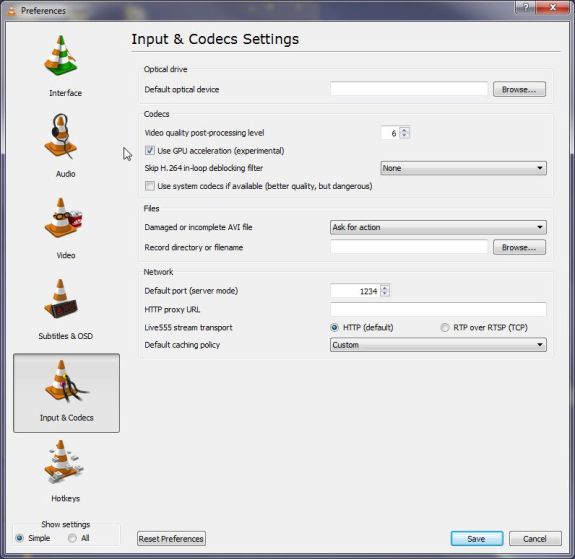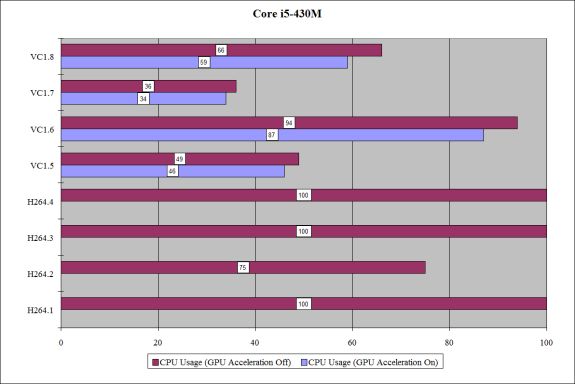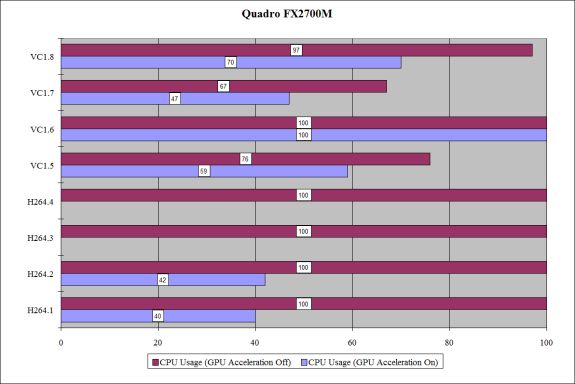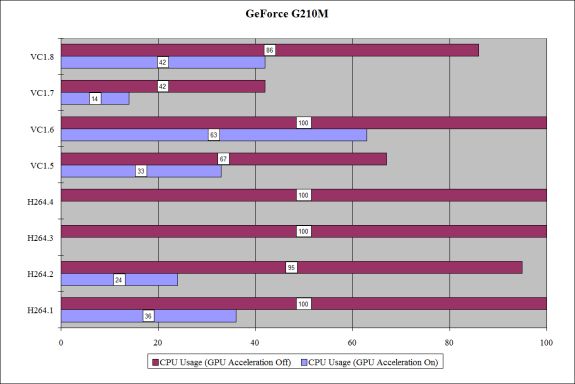HD Video Decoding on GPUs with VLC 1.1.0
by Ganesh T S on June 25, 2010 4:35 AM EST- Posted in
- Home Theater
- HTPC
After installing VLC 1.1.0, I was surprised to find that Blu-Ray sample clips continued to stutter during playback. I then realized that GPU acceleration was disabled by default. The option is hidden in the Preferences window accessible through the Tools menu.
The three graphs below show the maximum CPU usage during the course of playback with and without GPU acceleration (X-axis) for each of the 8 files listed in the previous section (Y-axis). A completely unwatchable video has no entry corresponding to it. Most of the videos showing 100% utilization were watchable except for a few stutterrs and dropped frames.
A quick look at the graph for the Intel i5-430M below show that the VLC - GPU interaction for H.264 is a complete failure. Upon initializing any H.264 stream, the screen turned completely green. On the other hand, VC-1 decode acceleration is not broken like H.264. CPU usage is lesser with acceleration turned on, but not by much. On being contacted with these details, VLC developer Jean-Baptiste Kempf indicated that the issue was quite simple, and was quite confident that the code would work as soon as the developer team had access to an Intel box.
Moving on to Nvidia's PureVideo VP2 decoder in the Quadro FX2700M, we find that both the L4.1 H.264 streams were accelerated without issues. However, L5.1 videos having more than 4 reference frames were rendered unwatchable due to extensive artefacting despite the fact that CPU usage remained low. From the same graph, we also find that VC-1 videos aren't accelerated as well as H264. This is due to the fact that the VP2 decoder doesn't provide VLD acceleration for VC1, but only IDCT. VLC manages to make use of the IDCT acceleration a little bit, but, obviously, the results are not as good as what one could achieve with VLD.
The GeForce G210M has Nvidia's latest PureVideo VP4 decoder (which supports acceleration for even MPEG-4 / DivX, but we are not testing those here). We observe that both H264 and VC-1 get accelerated as expected, but the L5.1 streams still have an issue. Jean-Baptiste Kempf seems to think that the L5.1 problem could be a result of issues with Nvidia's drivers as well as VLC code. A fix is expected once a bug report with a sample file is filed.














74 Comments
View All Comments
Boofster - Friday, June 25, 2010 - link
Not sure if it was mentioned but the K-Lite pack is by far the best I've used. It handles everything and is updated to the latest patches.I've also had great results with ffdshow from afterdawn but that ended with Windows 7.
CCCP + VLC was also just fine. No hardware GPU love for us ATI 5xxx traitors.
But K-Lite from http://www.codecguide.com/download_kl.htm with MPC-HC definitely trumps all.
larson0699 - Saturday, June 26, 2010 - link
Thank you. I've used KLCP+MPC since its inception with no trouble whatsoever, whether as a RunOnceEx-initiated install on a fresh OS or clients' existing junk configs (common sense -- look for, uninstall, and reg-clean the previous 1 or 2 codecs first). I'd experimented with other codec packs (Nimo was a common one years back) and VLC and always came back to the tried and true.The later versions of the pack are so dependent on ffdshow (in default install), however, that I'm considering using just ffdshow herein.
Stuka87 - Friday, June 25, 2010 - link
Hopefully they get a Mac port with the support out. As I use a Mac Mini as my HTPC. Although it would also need to support ATI or an Intel GMA (I have an old G4 Mini and an Intel).But its certainly a step in the right direction getting it working at all.
knowom - Friday, June 25, 2010 - link
This is why Nvidia has a better reputation from a driver and software standpoint over the competition it's like trying to compare x86 to ARM there's a reason x86 is preferable from a performance and usability standpoint.0roo0roo - Friday, June 25, 2010 - link
if you time stretch videos for some reason the vlc implementation of audio pitch adjustment is just not as clear as say gomplayers. it does cost a few dollars but coreavc's gpu acceleration works without a hitch right now, and with gom you can speed crank videos at your pleasure, using gpu accel on or off. vlc's problems are that its half baked in so many ways that its just a fall back player for me. it plays dvds well, i'll give it that.ganeshts - Friday, June 25, 2010 - link
True, it takes a jack of all trades master of none approach. Seems to have worked well so far, except that they now have some serious catching up to do with the rest of the media players :)mojtabaalemi - Saturday, June 26, 2010 - link
no idea about GPU Accelerarion on VLC but in CPU decode its one of lightest softwares i have seen ever . i could play some video files containing DVDRIPs and even 1080i mpeg videos on a vaio p serie with a poor z520 1.33GHz intel atom while any other player and codecs but coreavc were unable .so except for h264i will go for VLC on atom .
Rsaeire - Saturday, June 26, 2010 - link
I've been using MPC-HC, and MPC before that, for years now. MPC-HC is easily the best media player currently available as it plays DVD, mkv, DivX, Xvid, Blu-ray etc without the need for additional codecs. In addition, it even plays HD DVD, albeit with a little codec assistance. As such, it plays pretty much all the main media containers and codecs with ease and supports full GPU hardware acceleration of all HD codecs.As for the several users commenting on deinterlacing which such gems as it being a "legacy concept" or that "DVDs and Blu-Ray are not interlaced", I guess they need to do a bit more research regarding both video formats, as there is still content stored on both formats that is interlaced. If there wasn't, then why is deinterlacing such a big topic? You just need to check out the numerous posts on AVSForums or have a look at ATI's CCC to see the numerous deinterlacing options available, e.g. Weave, Bob, Adaptive, Motion adaptive, Vector Adaptive. I doubt that ATI would waste any time on providing so many different deinterlacing options for something that is "not important in the modern world".
vfigueira - Saturday, June 26, 2010 - link
Hi.I have an Asus 1201N.
The inicial install of windows 7, came with arcsoft, wich reads hd content smoth and with low cpu usage.
The problem with that player are using srt subtitles and usability.
I`m using "Gomplayer 2.2.25.5017" with "K-lite 5.7.5 Full" codecs, means that i`m not using built in codecs. I`ve been using previous versions of both, and the experience is pleasant, except for view dvd. Don`t recomend for dvd`s.
While reading this article i instaled both vlc and mcp-hc.
I made several tests using "trailer_720p.mov" form Avatar.
CPU USAGE during playback min and max;
Gomplayer - 17/49 average 32
Arcsoft - 09/36 average 14
vlc without hardware aceleration - 16/33 average 25
vlc with hardware aceleration - 13/28 average 16
windows media player - reads with 50 to 80 % of cpu usage, but is not smoth. not viewable
wmp classic hc - not smoth, high cpu usage
So, vlc is not bad, but i will stick with gomplayer using k-lite full
Sorry my english
mojtabaalemi - Sunday, June 27, 2010 - link
as you have 1201N?is it satisfying?
how long is battery life?
dual core atom 330 power?
and about mpc-hc : try a new version .